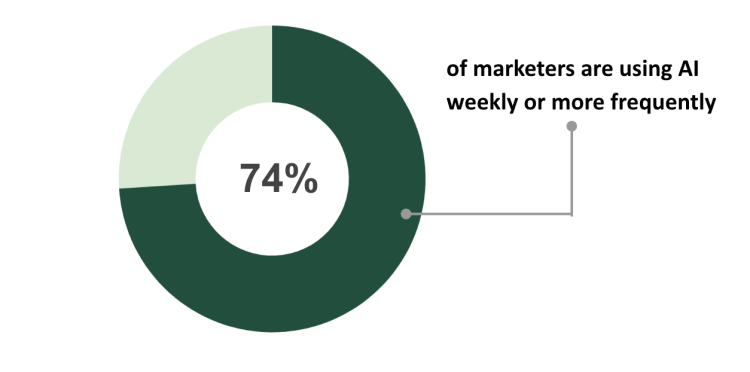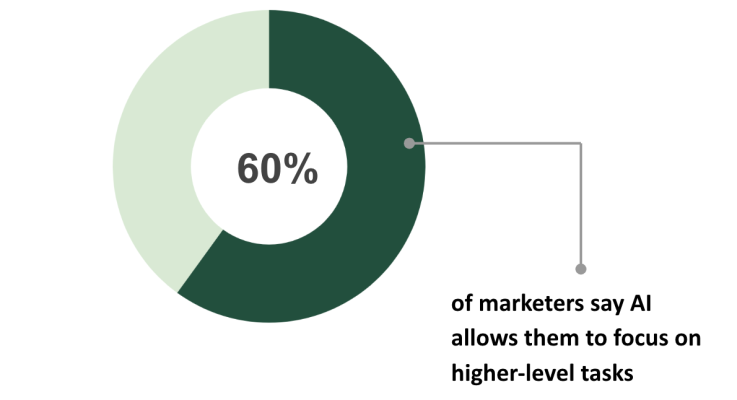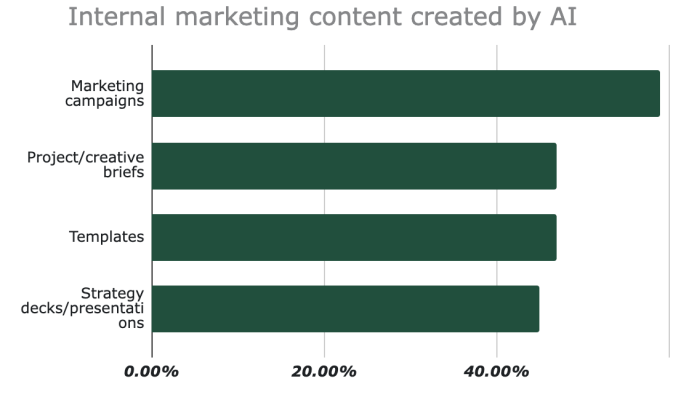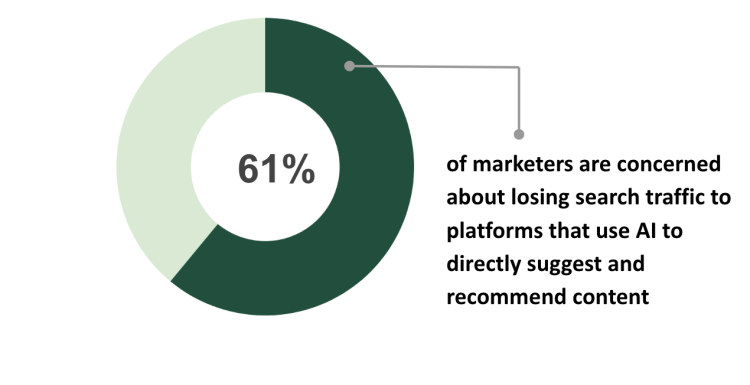Marketers love to be early adopters. So it shouldn’t be that surprising they would be one of the first groups to embrace AI. While there’s been a lot of hype (and hysteria) about AI in the general public, marketers are already using it at work and, for the most part, they’re excited by its promise to bring innovative, new capabilities to their efforts and its potential to help them offload tasks they don’t have time for. However, there are limits—and a fine line between what marketers say AI can do and what it should be allowed to do.
We got curious about AI and marketing and launched a study to find out how marketers viewed AI at work. We asked 403 marketing professionals how they feel about AI: its impact, how they use it, and its promise for the future*.
Here are 3 ways marketers are using AI today, and a peek into their plans for the future.
1. Automation, optimization, and analytics
Marketers seem to be ahead of the curve in terms of recognizing the potential of AI and are aware that it already powers many of the systems they use every day. Marketing automation, sales enablement, and experience management solutions all harness AI to improve and optimize the customer journey.
Even though many marketing solutions incorporate AI, marketers’ adoption and usage is still surprisingly high. Almost 3 out of 4 marketers say they use AI on a regular basis for a variety of tasks, and over a third (36%) are using AI daily.

AI isn’t being relegated to low-level, under the hook tasks. Instead, it’s being used in a broad range of areas; 55% of marketers say AI chatbots are used for lead generation, 54% are using it to analyze social media sentiment, and 47% are using it to offer customers personalized product or service recommendations. And, much of what AI offers would likely require intervention by analytics or product teams.
In many cases, the majority of marketers believe that AI is better suited for these tasks; 63% say AI does a better job at gaining insights from data than human marketers.
2. Personalization & tracking trends
While marketers don’t like to guess at what might resonate with a specific customer set, they often resort to a hunch or going with their gut. That’s where AI comes in—it can fill in the gaps around what will drive purchase and how to get customers to take the next step.
Whether it’s tailoring a message or an offer for a customer, or capturing a hot trend that is surging on social media, marketers believe that AI can help them be more effective and deliver better results.
73% of marketers feel AI helps them do their job better
In addition, AI is a good assistant—it can handle a lot of the rote, repetitive work that is often the backbone of marketing programs, giving marketers the ability to see the big picture instead of administering their efforts.

Not only does AI offload marketers, it raises the bar on what they can do. Marketers are aware that AI will come up with new approaches to solving problems, which could provide an edge.
74% of marketers say AI will make it easier for consumers to discover their company’s products and services
From making product recommendations that drive cross-sell and upsell opportunities to making it easy for consumers to find what they want, AI can deliver better outcomes for many marketing initiatives.
3. Transactional content and iterative design
There’s a lot of noise around the scary and slippery slope that generative AI presents. Marketers are well aware that AI generated content, video, and images present a threat not only to their job security, but also to the integrity and authenticity of what they do.
That said, marketers are willing to use AI to offload them from internal projects that require content and presentations, and are a part of getting a campaign off the ground. Creative briefs, strategy decks, and templates are all fair game.

In addition, marketers are willing to use AI to create the kind of information-only communications and creative that can be a time sink for brand and marketing teams. Emails (58%) topped the list, but social media copy (53%), ad copy (46%), images (43%), blogs and articles (41%) were also listed as the kinds of activities that marketers could offload to AI.
The tricky area
While AI-generated content can save time for marketers, it also poses a unique challenge. With its dizzying potential for scale, generative AI could completely upend how marketing materials are created, how websites are created, and search engines—and even the internet itself—functions. Marketers understand the power this brings to companies who are willing to invest in it—and the disadvantage it would level on companies who are slow to adopt or unwilling to play the game.

Ultimately, AI is a double-edged sword that can make marketers’ jobs easier, elevate their efforts, and give them a leg up over competitors—but also overwhelm teams who are slow to adopt or unwilling to use it effectively.
There’s a lot more to learn about AI and marketing. Get the report to find out how marketers believe it will impact their efforts—and what they can do to stay ahead of the AI game.
*SurveyMonkey study conducted among 403 marketing professionals on July 11-18, 2023. Respondents were selected from an online non-probability panel.
AI in Marketing
New research on how marketers are using AI today and its potential to impact the marketing landscape in the future.




